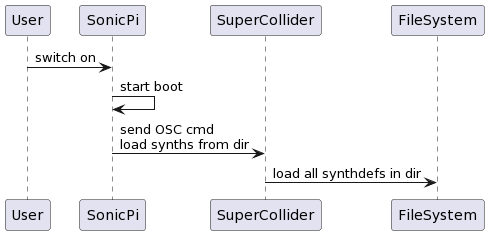Chapter 3 - Deep dive
How built-in synthdefs are loaded
Let’s go hunting for the code that loads synth definitions and see what it does.
This is the boot sequence:

Using a combination of the logging techniques in the previous section we can soon find out roughly how it works.
The very earliest message we see in the GUI is:
=> Welcome to Sonic Pi v5.0.0-Tech Preview 2
This message is sent from the runtime module:
def __load_buffer(id)
id = id.to_s
raise "Aborting load: file name is blank" if id.empty?
path = File.expand_path("#{Paths.project_path}/#{id}.spi")
s = "# Welcome to Sonic Pi\n\n"
if File.exist? path
s = IO.read(path)
end
__replace_buffer(id, s)
end
That function __load_buffer is called in one place and one place only, by the spider server.
We know that the spider-server is special because it sits in app/bin and not app/server/ruby/lib/sonicpi like the rest of the ruby code.
Spider has its own log in ~/.sonic-pi/logs and if we look at them we can figure out what’s going on:
Sonic Pi Spider Server booting...
The time is 2023-03-26 13:02:47 +0100
Using primary protocol: udp
Detecting port numbers...
Ports: {:server_port=>37064, :gui_port=>37065, :scsynth_port=>37066, :scsynth_send_port=>37066, :osc_cues_port=>4560, :tau_port=>37067, :listen_to_tau_port=>37071}
Token: 520542600
Opening UDP Server to listen to GUI on port: 37064
Spider - Pulling in modules...
Spider - Starting Runtime Server
TauComms - Sending /ping to tau: 127.0.0.1:37067
TauComms - Receiving ack from tau
TauComms - connection established
studio - init
scsynth boot - Waiting for the SuperCollider Server to have booted...
scsynth boot - Sending /status to server: 127.0.0.1:37066
scsynth boot - Receiving ack from scsynth
scsynth boot - Server connection established
scsynth - clear!
scsynth - clear schedule
scsynth - schedule cleared!
scsynth - group clear 0
scsynth - group clear 0 completed
Studio - Initialised SuperCollider Audio Server v3.11.2
Studio - Resetting server
Studio - Reset and setup groups and busses
Studio - Clearing scsynth
scsynth - clear schedule
scsynth - clear scsynth
scsynth - clear!
scsynth - clear schedule
scsynth - schedule cleared!
scsynth - group clear 0
scsynth - group clear 0 completed
scsynth - cleared scsynth
scsynth - bus allocators reset
Studio - Allocating audio bus
Studio - Create Base Synth Groups
Studio - Starting mixer
Studio - Starting scope
Spider - Runtime Server Initialised
Spider - Registering incoming Spider Server API endpoints
Spider - Booted Successfully.
Spider - v5.0.0-Tech Preview 2, OS raspberry, on Ruby 2.7.4 | 2.7.0.
Spider - ------------------------------------------
It co-ordinates the dance with the Tau server that handles timing and events and the SuperCollider server which actually makes the sounds.
Somewhere in here it starts up the sound module that actually starts the studio.
If we examine the initialize method of the class Studio and match what happens we can see how the synth definitions are loaded:
def initialize(ports, msg_queue, state, register_cue_event_lambda, current_spider_time_lambda)
STDOUT.puts "studio - init"
STDOUT.flush
@state = state
@scsynth_port = ports[:scsynth_port]
@scsynth_send_port = ports[:scsynth_send_port]
@msg_queue = msg_queue
@error_occured_mutex = Mutex.new
@error_occurred_since_last_check = false
@sample_sem = Mutex.new
@reboot_mutex = Mutex.new
@rebooting = false
@cent_tuning = 0
@sample_format = "int16"
@paused = false
@register_cue_event_lambda = register_cue_event_lambda
@current_spider_time_lambda = current_spider_time_lambda
@global_timewarp = 0
init_scsynth
reset_server
init_studio
end
If we trace down the last three function invocations and match their log messages to those in the spider.log we can see this function setting everything up for the user - after the SuperCollider and Tau engines have both started.
The last function to run on creating a new Studio is init_studio and it loads the synthdefs:
def init_studio
@server.load_synthdefs(Paths.synthdef_path)
@amp = [0.0, 1.0]
@server.add_event_handler("/sonic-pi/amp", "/sonic-pi/amp") do |payload|
@amp = [payload[2], payload[3]]
end
Actually it tells the server to load them: which it does by sending an OSC message to SuperCollider:
def load_synthdefs(path)
info "Loading synthdefs from path: #{path}" if @debug_mode
with_done_sync [@osc_path_d_loaddir] do
osc @osc_path_d_loaddir, path.to_s
end
end
The format of the message is an instruction to load code and a filepath - so at this stage Sonic Pi doesn’t know anything more about the built in synthesisers other than their location etc/synthdefs/compiled.
If we pop a new compiled synthdef in here it will load on boot automatically.
